Category Archives: Physics World Discovery
Adaptive optics in biology
By Matin Durrani
For centuries, astronomers looking up at the heavens through a telescope had a problem on their hands – the quality of their images depended on the strength and direction of the wind in the air. Trouble is, the Earth’s atmosphere isn’t uniform because its density – and thus its refractive index – varies from point to point as the wind blows. Result: distorted images.
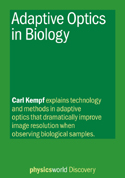
Carl Kempf’s new short-form Physics World Discovery ebook is free to read
In 1953, however, astronomer Horace Babcock proposed a clever solution, which was to bounce incoming light off a device that can rapidly correct for changes in optical path-length, which flattens the wave-front and so counteracts the effects of aberration. Any remaining wave-front errors are measured after the correction, before a feedback control loop uses the measurement to continuously adjust the corrections applied to the wave-front.
That was the principle behind “adaptive-optics” technology, which has since gone on to become a routine and invaluable part of astronomy. Turns out, however, that the same principles can be used in microscopy too, leading to many applications of adaptive optics in medicine and biology too, as I’ve discovered by commissioning and editing a new short-form Physics World Discovery ebook by Carl Kempf.
Kempf is a senior systems engineer at the California-based firm Iris AO, Inc, which is heavily into adaptive-optics technology, having worked on sensing, actuation, and control systems for high-precision devices for more than 30 years. I’m pleased to say that Kempf’s short ebook, Adaptive Optics in Biology, is now available for you to read free in EPUB, Kindle and PDF format via this link.
To give you some more idea of what the book is about and his career to date, I put some questions to Kempf, which you can read below. Don’t forget either that there are plenty of other books in the Physics World Discovery series, ranging from multimessenger astronomy to quantitative finance.
View all posts by this author | View this author's profile
Discover why the philosophy of physics is vital
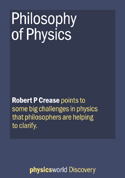
Think about it: Robert P Crease’s new short-form Physics World Discovery ebook is now available to read for free
By Matin Durrani
Avid readers of Physics World will know that we have for many years published a monthly column called “Critical Point” written by Robert P Crease, a historian and philosopher of science from Stony Brook University in New York, in which he examines the interface between physics and the wider culture.
I’ve always felt Crease’s work is interesting but I’m aware that many physicists scoff at the notion of philosophers trying to understand how science works. It’s a waste of time, right?
Following a meal at a vegetarian restaurant round the corner from his apartment in Manhattan earlier this year, I managed to persuade Crease to write one of our new, short-form ebooks that go under the the Physics World Discovery banner. My challenge was for him to explain to physicists just what it is philosophers of physics do – and why their work is important.
You can read Crease’s book Philosophy of Physics, which has just been published, for free in either epub, Kindle or PDF formats via this link. To whet your appetite, Crease has answered some questions about his approach to philosophy and why the book is worth reading. Don’t forget there are plenty of other books in the Physics World Discovery series, ranging from multimessenger astronomy to quantitative finance.
View all posts by this author | View this author's profile
New cosmic messengers, and what they can tell us
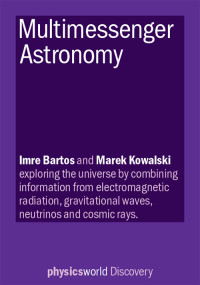 By Margaret Harris
By Margaret Harris
Immediately after last year’s announcement that the Laser Interferometer Gravitational-Wave Observatory (LIGO) had seen its first gravitational waves, a lot of the discussion centred on what the discovery meant for general relativity. This was understandable: getting further confirmation of Einstein’s century-old theory was (and is) a big deal. But in the longer term, and as the LIGO detectors notch up a few more observations (they’re currently crunching data on six new candidates), the emphasis will shift away from the waves themselves, and towards what they can tell us about the universe.
The key thing to realize here is that gravitational waves are fundamentally different from other, better-studied cosmic “messengers” that travel to Earth from distant reaches of the universe. Unlike photons, gravitational waves are not impeded by clouds of gas or dust; unlike cosmic rays, they are not deflected by electromagnetic fields. In addition, some of the most dramatic astrophysical events, such as the merger of two black holes in empty space, are “dark” or “silent” to other messengers: these events produce gravitational waves in copious quantities, but not, as far as we know, anything else.
View all posts by this author | View this author's profile
So you want to know about the dark universe?
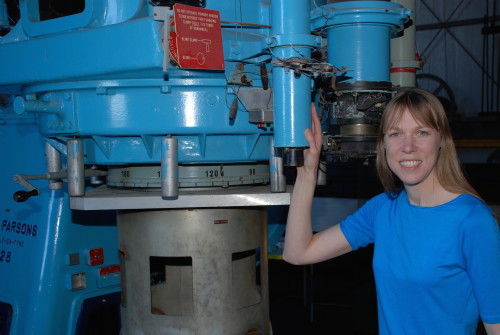
Big thinker – Catherine Heymans is an observational cosmologist at the University of Edinburgh and author of the new Physics World Discovery ebook The Dark Universe.
By Matin Durrani
It never ceases to amaze me that we know almost nothing about 95% of the universe. Sure, the consensus is that 25% is dark matter and the rest is something dubbed “dark energy”, but beyond that our knowledge is wafer thin.
The flip side, though, is that there’s plenty for physicists to get stuck into. And if you want to get up to speed with the field and find out more about some of its challenges, do check out a new free-to-read Physics World Discovery ebook by Catherine Heymans from the Royal Observatory, University of Edinburgh, UK.
Available in ePub, Kindle and PDF formats, The Dark Universe explains the dark enigma and examines “the cosmologist’s toolkit of observations and techniques that allow us to confront different theories on the dark universe”. And to get you in the mood for all things dark, I asked Heymans some questions about her life as a research scientist. Here’s what she had to say.
View all posts by this author | View this author's profile
Space weather: it’s all about impact
By Susan Curtis
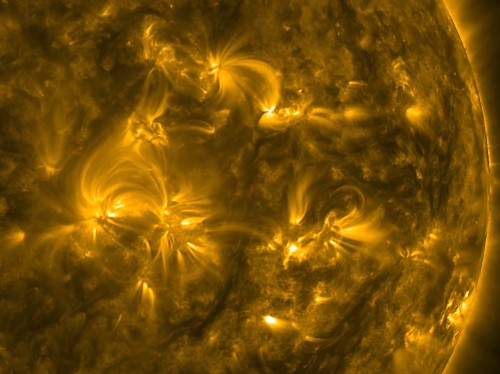
Dangerous affair – an extreme ultraviolet image of a tangle of arched magnetic filed lines in the Sun’s corona, taken in January 2016 by NASA’s Solar Dynamics Observatory. (Courtesy: Solar Dynamics Observatory, NASA)
We all love a good disaster movie, but when it comes to real life it’s all too easy to downplay a dangerous but distant threat. Many people choose to live on active volcanoes, the citizens of San Francisco know that “the Big One” could strike at any moment, and yet they believe that the benefits of living in those locations outweigh the risk of a severe event happening in their lifetime.
The same dilemma faces the community of scientists, engineers and policy-makers who are working to understand the impacts of space weather – changes in the Earth’s environment that are largely are driven by physical processes originating from the Sun. Space weather has the potential to disrupt or even damage critical infrastructures on Earth, such as the power grids, aviation routes and communication systems that modern societies depend on, but the last notable event dates back to 2003.
That’s why Mike Hapgood, who heads up the Space Weather Group at RAL Space, part of the UK’s Rutherford Appleton Laboratory, has written a new, free-to-read Physics World Discovery ebook called Space Weather. “I thought it would be a great opportunity to highlight what space weather is really about, and to show how we are linking our scientific knowledge to a better understanding of the impacts on society,” he comments.
View all posts by this author | View this author's profile
Quantitative finance: what’s it really all about?

Mixing physics and finance – Jessica James is the author of the new Physics World Discovery ebook Quantitative Finance.
By Matin Durrani
Among the many joys of studying physics is that a degree in the subject can take you down lots of different paths. As our recent Physics World Careers 2017 guide revealed, they range from research and industry to education, IT and even sports, politics and the arts.
One particularly popular destination is the world of finance, which is hardly surprising given physicists’ love of numbers. Those in finance work in many different areas, with one of the most high profile – and lucrative – being the field of “quantitative finance”.
But what exactly does the term mean and what’s the field all about? To find out more, do check out the new, free-to-read Physics World Discovery ebook entitled Quantitative Finance, written by Jessica James – a managing director and senior quantitative researcher at Commerzbank in London.
As James explains in the introduction to her book, the field includes “complex models and calculations that value financial contracts, particularly those which reference events in the future, and applies probabilities to these events”. I encourage you to read her book, which is available in PDF, ePub and Kindle formats. And to whet your appetite, James has kindly answered some questions about what she does, her career to date and what the book’s about.
View all posts by this author | View this author's profile
Proton therapy: the benefits and the challenges
Proton therapy is an increasingly popular treatment technique that uses beams of protons to accurately target and destroy cancerous tumours. A new Physics World Discovery ebook, Proton Beam Therapy, takes a close look at the physics of this cancer treatment, its benefits and the challenges associated with bringing this approach into the clinical mainstream.
The ebook is written by Harald Paganetti, director of physics research at Massachusetts General Hospital and professor of radiation oncology at Harvard Medical School. He is a pioneer in advanced Monte Carlo dose calculations for proton therapy, and is considered the world expert on the relative biological effectiveness of proton beams.
In the last few decades, proton therapy has transitioned from research laboratories into the clinical setting – making this publication particularly timely. There are currently around 60 proton therapy facilities worldwide, and this number is increasing rapidly. “Proton therapy is becoming a standard treatment option but there are still many challenges in terms of the physics, biology and clinical use of protons, which are summarized in this ebook,” Paganetti explains.
View all posts by this author | View this author's profile
